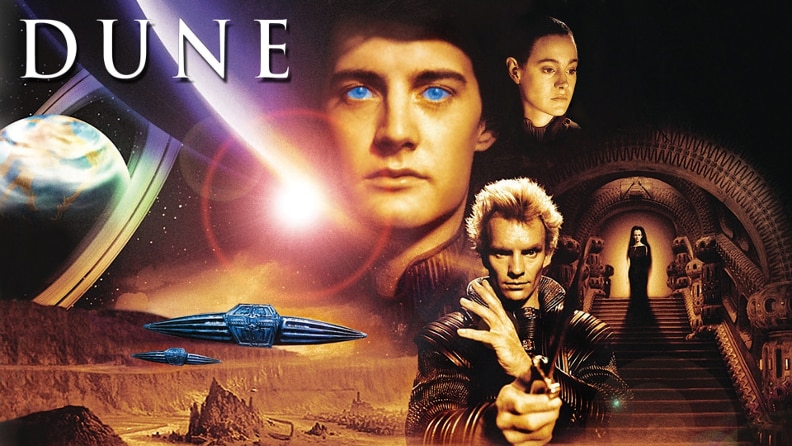To this day, it is remarkable that David Lynch’s Dune is a thing that actually exists, however mangled.
The decision to hire Lynch to direct the 1984 adaptation of Frank Herbert’s science fiction epic probably made sense at the time. Lynch had established himself as a talent to watch with his surrealist debut Eraserhead, and he had followed it up with the more mainstream prestige piece The Elephant Man. That film earned eight Oscar nominations, including a Best Director nomination for Lynch.
More than that, Lynch had been (however briefly) shortlisted as a potential candidate to direct Return of the Jedi. Given that Dune producer Dino de Laurentiis clearly wanted a science fiction box office smash like Star Wars, this probably made Lynch all the more appealing as a director. It didn’t matter that Lynch had no real interest in the science fiction trappings of Star Wars — he was a viable option.
This sort of career trajectory is common today, with directors frequently jumping from ambitious indie debuts to more mainstream fare to blockbusters. In hindsight, it’s hard to imagine a world where Lynch might have migrated full time to the mainstream, but it’s a model that has worked for filmmakers as diverse as Christopher Nolan, Sam Raimi, and Guy Ritchie.
Dune was a fiasco. Lynch’s intended cut was three hours long, but the theatrical cut was trimmed to about two hours, largely driven by exposition. It earned $31M on a $40M budget. The reviews were not kind, with Roger Ebert describing it as “an incomprehensible, ugly, unstructured, pointless excursion into the murkier realms of one of the most confusing screenplays of all time.”
To be fair, there has been a minor movement to reclaim Dune as a lost masterpiece. Lynch himself has no interest in revisiting the film, declining invitations from Universal to produce a director’s cut. Lynch clearly still feels wounded by Dune, acknowledging, “With Dune, I sold out on that early on, because I didn’t have final cut, and it was a commercial failure, so I died two times with that.”
Revisiting David Lynch’s Dune, more than three decades removed from its original release, is a remarkable experience. Time dulls a lot of the problems, even if it can’t conceal the most obvious of them. However, time also flatters the film in some respects. For both better and worse, there are very few blockbusters on the scale of David Lynch’s Dune that are quite so idiosyncratic.
Lynch was never going to make a particularly literal or faithful adaptation of the source novel. Lynch is not a major science fiction fan and never has been. This was a potential issue in 1984, when it seemed possible Dune would only get one shot at blockbuster glory. This is less of a problem now, after a more faithful Sci-Fi Channel miniseries and with a new version arriving at Christmas.
Lynch’s Dune is at its weakest when it tries to do things that simply fall outside of Lynch’s sensibilities. The film opens with a solid half hour of exposition: five consecutive scenes of characters pounding the audience into submission with technobabble, punctuated only by the opening credits. Particularly cringe-worthy are efforts to make it sound naturalistic. “Oh, yes. I forgot to tell you,” presses Princess Irulan (Virginia Madsen), just when you think the information dump might stop.
Dune feels like a bullet-point treatment of a crowd-pleasing blockbuster. The first third of Dune is awkwardly burdened by dialogue-driven exposition. The final third is a whirlwind montage punctuated by clumsy voiceover. Key emotional beats, like the reunion of Paul (Kyle MacLachlan) and Gurney Halleck (Patrick Stewart), seem to happen almost by accident. It occasionally feels like particular actors just happened to be on set on a given day, and the rest was covered by ADR.
Star Wars casts a long shadow over Dune. The film feels like it has been awkwardly beaten into a shape that audiences will associate with Lucas’ space opera. Lynch eschews a lot of the nuance of Herbert’s novel, playing Paul’s desire to vanquish the evil emperor and so reconcile with his lost father entirely straight. The novel inspired Star Wars, but the film seems content to rip it off.

And yet, in spite of all of that, there is something strangely beautiful about the fact that David Lynch was given enough freedom to write and film a blockbuster science fiction epic, even if he was not allowed to edit it. Dune will always be the black sheep of Lynch’s filmography, even compared to something like The Straight Story. However, it is still recognizably his.
Part of this is because Lynch clearly does respond to certain parts of the source novel, even if those parts aren’t the narrative itself. Lynch has often expressed a fondness for “dream logic,” and Dune leans heavily into the idea of dreams and consciousness expansion. Paul spends almost as much screen time dreaming as he does delivering exposition. Awakening becomes a key motif.
This dream logic drives a lot of Dune. There is a sense of the uncanny to the film, which is rare in filmmaking of this kind. It’s reflected in choices both large and small, from vivid splashes of bright red blood through to an inexplicable scene in which Gurney Halleck carries an adorable pug into battle. There’s a sense of “not quite right”-ness to all this, mounting and building across the runtime.
Dune has been described as a critique of late capitalism. Denis Villeneuve has praised the book as “a distant portrait of the reality of the oil and the capitalism and the exploitation of Earth.” This horror is reflected in the book’s emphasis on the way that human beings are transformed into tools — the Bene Gesserit concubines, the computer-like Mentats, the monstrous Guild Navigators.
Lynch is drawn to those elements of the story. The opening scenes establish the Guild as a fusion of flesh and metal. Inhumanity is a major theme of Lynch’s work, evident even in what’s been described as the “industrialization of the reproductive process” in Eraserhead. The Navigators have mutated into something alien, but their escorts look like their own humanity has been stripped out. Are they even human anymore?

Lynch often juxtaposes old-fashioned Hollywood spectacle with genuine grotesquery. Lynch is a life-long fan of The Wizard of Oz, so it is no surprise that the rich greens of the Harkonnen headquarters on Geidi Prime should evoke the Emerald City. However, these bright green spaces are populated with monstrous industry, channeling the aesthetic of Eraserhead and The Elephant Man.
There is a fundamental “wrongness” to these jarring contrasts. At one point, the Beast Rabban (Paul Smith) adds some color to his drab gray throne room on Arrakis by arraying the bodies of his deceased servants. This macabre detail is never foreground, but the background of these shots is a sea of green overalls punctuated with the occasional splash of red from a slashed throat.
Dino de Laurentiis might have wanted a science fiction adventure like Star Wars, but Lynch clearly had something much older on his mind. His spaceships don’t move like the dogfighters from Lucas’ whirlwind blockbuster, but hover slowly like the flying saucers from 1950s B-movies. The desert scenes are shot to evoke David Lean’s Lawrence of Arabia, appropriate given Herbert’s inspirations.
This leads to some striking choices. Lynch doesn’t shoot Paul’s ascension in the warm style of the climax of Star Wars. Sequences like Paul addressing his Fremen followers are harsh and stark, more overt in their homage to The Triumph of the Will. Lynch also favors the sort of wide-angle, long-distance crowd shots associated with the swords-and-sandals films of the 1950s, underscoring the religious nature of Paul’s transformation. It’s a science fiction biblical epic, one drawing from Islamic theology.

The result is something just close enough to contemporary blockbusters to fit within the framework of a 1980s epic adventure, but just distant enough to push it into the realm of the uncanny. Dune has all the trappings of a conventional Campbellian blockbuster in terms of narrative and structure, but is subtly alien in terms of texture and sensibility.
On a storytelling level, Lynch’s Dune is a direct translation of the rough outline of the source novel, albeit one that erases a lot of the richness and complexity buried within the text. However, Lynch’s directorial impulses are just far enough askew to ensure that the film is never as generic and conventional as the script might want it to be. The words are familiar, but the grammar is alien.
Frank Herbert’s Dune was a brutal deconstruction of the familiar and archetypal “chosen one” narratives that defined so much science fiction and fantasy. On a level of story, Lynch’s adaption misses that deconstruction and instead offers a much more straightforward story of a dispossessed prince leading an army to avenge the destruction of his family.
However, in its own way, Lynch’s adaptation feels like a companion to Herbert’s novel. Herbert took the outline of the classic hero’s journey and made it horrific. Lynch takes the template of a crowd-pleasing blockbuster and renders it monstrous. There’s never been another blockbuster quite like it, and it’s worth celebrating for that alone.






Published: Apr 19, 2020 02:59 pm